If you just can’t wait for Mick Moloney’s big musical fund-raiser at St. Malachy’s Church in North Philly—a benefit for the parish’s vibrant and indispensible school on November 2—you can get yourself a great little preview.
Compass has recently released “Absolutely Irish,” the CD version of the April 2007 Public Television show of the same name.
It’s Moloney’s magic that he can bring together many of your favorite artists—you never know quite who will show up for the St. Malachy show, and you’ll kick yourself for sure if you miss it. On this CD, producer Moloney has assembled quite the stellar cast, including guitarist John Doyle, Séamus Egan of Solas, the irrepressible Joanie Madden of Cherish the Ladies, the brilliant singers Karan Casey and Robbie O’Connell, and fiddlers Liz Carroll, Athena Tergis and Eileen Ivers. Also appearing: Susan McKeown, Niall O’Leary, Darrah Carr, Jerry O’Sullivan, Billy McComiskey, Brendan Dolan, Rhys Jones, Tim Collins, Mac Benford, Mike Rafferty and Jo McNamara.
Yikes.
O’Connell and Tergis were part of last year’s lineup at St. Malachy’s. (Read our story.)
It’s hard to pick a bad tune off this CD, though there were a couple of “off” notes.
For example, I didn’t particularly care for Susan McKeown’s interpretation of “Fair London Town.” It just seemed slightly out of her range, and she was noticeably flat on many of the higher notes. She’s a wondrous singer, so figure it was an off night. And I’m a nut for bluegrass, which has deep ties to traditional Scottish and Irish music, but “June Apple,” with Mac Benford and Rhys Jones, was not my cup of tea. It might be yours, though.
As for all the rest, there are few tunes that are now enjoying heavy rotation on my car CD player. Particular favorites were several songs, including “Flower of Kilkenny,” featuring Robbie O’Connell, “The King’s Shilling,” with Karan Casey doing the honors, and “McNally’s Row of Flats,” a great little ensemble tune that Mick and friends performed last year at St. Malachy.
All of the stars get a chance to shine, including Liz Carroll and John Doyle first, then Doyle and Joanie on a blazing set, “Before the Storm/The Black Rogue/The Lass of Ballintra/The (Other) High.” Many of the gang—John Doyle, Séamus Egan, Liz Carroll, Joanie Madden, Tim Collins, Eileen Ivers, Billy McComiskey and Jerry O’Sullivan—get together on a gorgeous set of jigs, “Lark in the Morning/Cannabhan Ban/Humours of Ballyloughlin.”
Listen to the fireworks, too, on a fiddle extravaganza “Never Was Piping So Gay/The Chandelier/Paddy Fahey,” with Liz Carroll, Eileen Ivers, Athena Tergis each taking a turn, accompanied by the inimitable John Doyle on guitar. The three ladies bow at breakneck speed to start, but when Ivers comes in, the whole things slips into overdrive. (At least it seems noticeable to a drummer.) If anyone but John Doyle was playing accompaniment, his arm would be falling off at the end.

